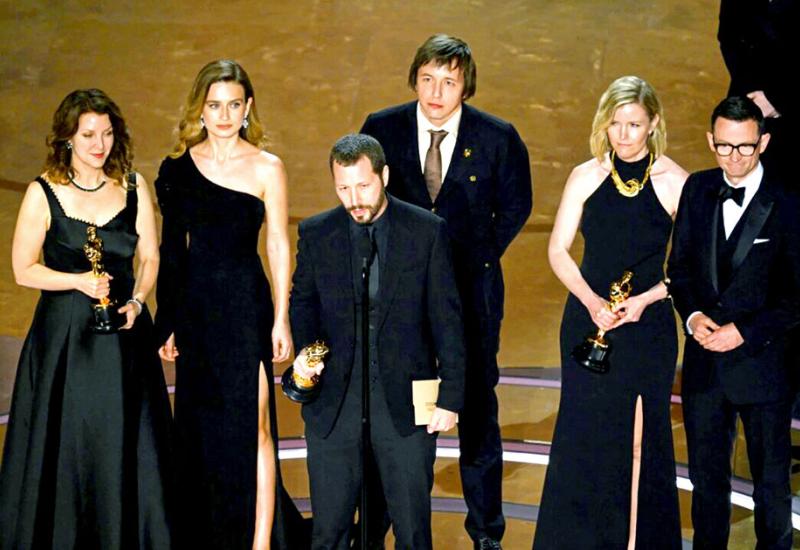The film "20 Days in Mariupol", created by the Associated Press team, which included FEL graduate Yevhen Malolietka, received the most prestigious award of the American Film Academy in the nomination "Best Documentary". This is the first Oscar for Ukraine and the first film created on the front line in the history of the award.
The film was made by director and photographer Mstyslav Chernov, photographer Yevhen Malolietka, and producer and journalist Vasylisa Stepanenko. In 2022, they were the only international journalists in the besieged city and documented everything that was happening there: the humanitarian catastrophe caused by the Russian siege, war crimes, mass graves of civilians, and the work of doctors who were desperately recording the deaths of children, from teenagers to infants. Thanks to their photo and film documentaries, the world saw for the first time the poignant photos of Mariupol, including the aftermath of the bombing of Maternity Hospital #3.
In 2023, all three received the Pulitzer Prize, the most prestigious award among journalists, for their impressive testimony to the ongoing war, and in 2024 they were awarded the Taras Shevchenko National Prize of Ukraine. In total, the film received 20 awards worldwide and became the highest-grossing Ukrainian documentary. Last September, the film was shown before a meeting of the UN General Assembly.
However, the power of the charge of truth that this documentary carries is best evidenced not so much by the numerous awards as by the hostile propaganda against it. For example, at a film festival in Serbia, the organizers even canceled its screening, calling it "an anti-Russian propaganda film by the Kyiv regime" and "an attempt by the West to change the attitude of the Serbian people towards fraternal Russia."
"I'll probably be the first director to say it here: I wish this movie didn't exist. I wish Russia had never attacked Ukraine, never occupied our cities. I would have given this award so that Russia would not have killed tens of thousands of my fellow Ukrainians, and released all Ukrainian soldiers and civilians who are in captivity. But I cannot change history. I can only remind us that we must not forget those who died in Mariupol and other Ukrainian cities, whose lives were taken by this war. Movies shape memories, memories shape history. Glory to Ukraine!" said Chernov during the award ceremony.
Naturally, responses to this remarkable event are spreading online: "I believe that someday there will be an Oscar for a feature film. The movie is about Mstislav Chernov, Yevhen Malolietka and Vasilisa Stepanenko and about the policeman Volodymyr who took them out of Mariupol. It's about the cameras and disks hidden under the passenger seat of the car, and the 15 Russian checkpoints they passed, with a search at each one. The Oscar-winning director who will make this movie may use the artistic technique of a person turning gray during the movie." Attention is also drawn to the exquisite appearance of the Ukrainian team at the ceremony: "Ours are not only well-dressed. They are beautiful people. We are a beautiful nation. You can feel the dignity, you can feel that the movie the team made is not just a movie, it's a part of life, it's a message to the world." But they also remember the reporters who were killed in the bloody war: "Even from the materials included in the film, it is clear that they managed to survive by a miracle. As well as to take the footage out of the siege. This is a miracle - and a great courage. It is also an opportunity to remember all those journalists and filmmakers who paid a heavy price for their desire to tell the truth about this war - Max Levin, Mantas Kvedaravičius and many others."
It is obvious that this prestigious award is important not only for our film industry. It is important for each of us. It is important for our belief in the victory of light over darkness, the victory of good over evil. The film is important for our victory on the battlefields. The victory of the desperate.
For reference:
The name "Oscar" is associated with the legend of the Academy's executive director Margaret Herrick, who remarked that the statuette resembled her uncle Oscar. The figurine itself is made of bronze and covered with 24-carat gold, is almost 34 centimeters high and weighs 3.5-3.85 kg.
Our newspaper told about Yevhen Malolietka, a graduate of Igor Sikorsky Kyiv Polytechnic Institute, and his work during the full-scale invasion in KP #25-26 of 2023, and about Max Levin, a graduate of Igor Sikorsky Kyiv Polytechnic Institute, in KP #27-28 of 2023.

